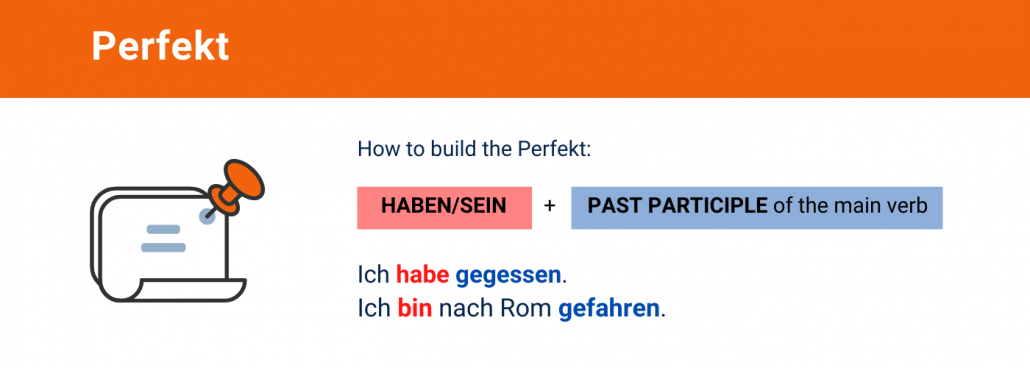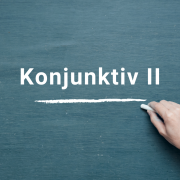The German Perfekt (perfect tense)
What is the Perfekt and how do we build it? Here we try to sum up everything you need to know about this tense.
The Perfekt, just like the Präteritum, is used to talk about something that happened in the past. In fact, the Perfekt and the Präteritum are often used interchangeably. You could say “Gestern habe ich ein Buch gekauft” or “Gestern kaufte ich ein Buch”.
The meaning is always the same: “Yesterday I bought a book“.
However, Germans mainly use the Perfekt in everyday oral language, whereas in the written and formal language they prefer the Präteritum.
How to build the Perfekt
The perfect tense (Perfekt) is formed by an auxiliary verb and a past participle (Partizip II). The auxiliary verb can either be “haben” or “sein”, depending on the main verb, and it must be conjugated in the present tense (Präsens) according to the subject. Remember to put the past participle at the end of the sentence.
Ich habe eine E-Mail geschrieben. – I wrote an e-mail.
Sie ist nach Paris geflogen. – She flew to Paris.

Past participle: weak, strong and mixed verbs
Weak verbs (schwache Verben)
Weak (regular) verbs build the Partizip II with the prefix GE and the suffix T. These should be added to the verb’s stem. For instance:
SAGEN – GESAGT
KAUFEN – GEKAUFT
LERNEN – GELERNT
If the stem ends in -T or -D we should add an E between the stem and the suffix T:
ARBEITEN – GEARBEITET
WARTEN – GEWARTET
REDEN – GEREDET
If the verb ends in -IEREN we do not use the prefix GE:
TELEFONIEREN – TELEFONIERT
FUNKTIONIEREN – FUNKTIONIERT
Strong verbs (starke Verben)
Moving on to strong verbs, their past participle does not follow a general rule. They add the prefix GE and they end in EN, but the stem often changes. For this reason, it is important to learn these verbs’ past participle by heart. A few examples:
FAHREN – GEFAHREN
GEHEN – GEGANGEN
BLEIBEN – GEBLIEBEN
HELFEN – GEHOLFEN
TRINKEN – GETRUNKEN
Mixed verbs (gemischte Verben)
Mixed verbs add the same prefix and suffix as regular verbs, but they change their stem:
BRINGEN – GEBRACHT
DENKEN – GEDACHT
WISSEN – GEWUSST
KENNEN – GEKANNT
Certain rules apply to both weak and strong verbs. For instance, when it comes to separable verbs, GE has to be put between the prefix and the root.
AUFRÄUMEN – AUFGERÄUMT (weak verb)
MITNEHMEN – MITGENOMMEN (strong verb)
EINSTEIGEN – EINGESTIEGEN (strong verb)
If the verb is non-separable (meaning that the verb has a prefix that never gets separated from it), we do not put GE:
VERSUCHEN – VERSUCHT (weak verb)
BESUCHEN – BESUCHT (weak verb)
UNTERNEHMEN – UNTERGENOMMEN (strong verb)
“Haben” or “sein”? Which auxiliary verb should we use?
In most cases, the Perfekt is built with “haben”. Nevertheless, verbs that indicate movement build the Perfekt with “sein”.
Ich bin nach Paris gefahren. – I went to Paris.
Er ist nach Hause gelaufen. – He walked home.
Wir sind zur Party gekommen. – We came to the party.
The same verbs can be used with “haben” when they have a direct object (Ich habe ein Auto gefahren – I drove my car), as well as when the focus is on the activity and not on the movement itself (Er hat eine Stunde gelaufen – He walked for an hour).
All reflexive verbs have “haben” as auxiliary verb.
Sie hat sich angezogen. – She got dressed.
Wir haben uns verirrt. – We got lost.
In addition, we should consider the verb’s transitivity. Transitive verbs (with direct object) build the perfect tense with “haben”, whereas intransitive verbs usually build it with “sein”.
Ich habe einen Apfel gegessen. – I ate an apple.
Ich bin geblieben. – I stayed.
Was ist passiert? – What happened?
Please note that the same verb can be used both as a transitive and as an intransitive verb.
Das Glas ist gebrochen. – The glass broke.
Ich habe das Glas gebrochen. – I broke the glass.
Was hast du gestern gemacht?
If you want to practice, try to list all the things you did yesterday. We gave you some examples.
- Ich bin aufgestanden. – I got up.
- Ich habe Brot mit Honig gegessen. – I ate bread with honey.
- …
Looking for a German course?
Have a look at our website! Berlino Schule offers German courses with qualified teachers at a very convenient price. Feel free to contact us at info@berlinoschule.com in case you need any information.
Our contacts
Gryphiusstraße 23, 10245 Berlin-Friedrichshain
+49 030 36465765
info@berlinoschule.com
Facebook page
Instagram profile




 Tedesco Goethe German language studiare tedesco
Tedesco Goethe German language studiare tedesco  German Grammar Webinar Online Classes
German Grammar Webinar Online Classes 
 Tedesco Goethe German language studiare tedesco
Tedesco Goethe German language studiare tedesco
Leave a Reply
Want to join the discussion?Feel free to contribute!